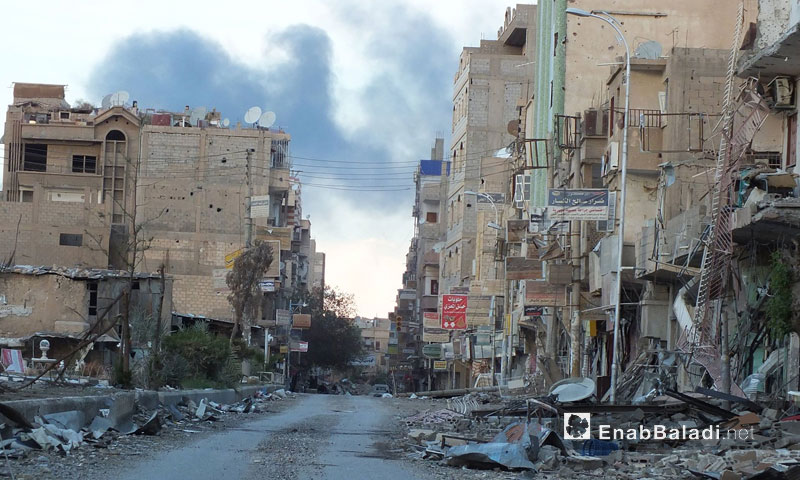



Um Samir, 43 years old, admits the difficult life she is living. But still, she is doing her best to cope with reality and searches for optimism through her return to work in a small shop with Deir ez-Zor’s economic revival and life’s return to its markets, amidst fears of some merchants’ monopoly on the market.
The woman tells Enab Baladi that she is keen to restore all that she has lost, explaining that she and three of her children work in the shop, which was closed till a month ago in the shadow of the commodities’ absence and the siege that were suffered by a number of the city’s neighborhoods, on top of which are al-Jorah and al – Qosoor, which were besieged for more than three years.
The return of the commercial activity after opening the roads and the admittance of commodities to Deir ez-Zor, which Assad’s forces have controlled late in 2017, reactivated the economic wheel in some of its neighborhoods, especially al-Jorah and al – Qosoor, as Um Samir said, adding that “everything in the market today is demanded and there is a huge opportunity for investments.”
It is a period that Um Samir regards as suitable to compensate financial loss which was the fate of the majority of people in the past a few years, especially small investments, aspiring to expand its economic activity “I seek to open a wholesales shop and a restaurant to supervise by myself.”
The confidence that Um Samir showed appeared in the speech of other people who work in the field of commerce, both former residents and returnees to the city; Abu Hassan, 56 years old man, who runs a shop for building materials, is one of them.
He tells Enab Baladi that the city is striving with beneficial commercial activities, which encouraged many people to enter the field in an attempt to develop their income. Abu Hassan believes that the commercial returns are sufficient, “but they are still dangerous, especially under the security threats and some of militias’ hegemony over the people and merchants.”
Abu Hassan is worried that royalties might be imposed on the people who are working in the field of commerce, “this might reach the degree of taking part of the people’s gains. Some employees and officials are, today, exploiting their positions to subjugate the merchants and make money.”
He is also afraid of some merchants’ control over the market and their monopoly on the commodities “under the absence of fair competition, for they are supported by security systems and had powerful relations with the regime.”
Abu Ali, 45 years old am, runs a real-estate office in the city. He tells Enab Baladi that, today, Deie ez-Zor is witnessing an emerging economy, full of opportunities and capabilities. Nevertheless, he speaks of the lacking equality and the regime’s support for some of the merchants, “turning them into whales that refuse all competitors and use their means to dominate.”
“The people’s need for protection under the almost out of control security situation and the corruption that is penetrating the State’s establishments that are concerned with commercial censorship and accountability” are all obstacles that according to Abu Ali hinder the people seeking to compensate their financial loss.
Some of the people, who Enab Baladi has interviewed, say that dozens of the employees in the regime’s departments and the officials in the municipality, healthcare, water, education and fiscal departments “are trying to exploit the status quo to make money directly through bribes, intermediary and commissions. Some of them force themselves as partners in the commercial movement.”
Commercial action has affected most of the sectors: commodities, the services department and electronic materials, according to Abu Ali, who points out that “the real-estate market is the most vivid and beneficial; it is also the most successful market, and the one to guarantee gains and less dangers.”
The positive effect of the economic movement has impacted all the people in the city, according to Abu Ali, for it is expanding the commercial activity, increasing the people’s gains and creating a space for competition, “this might benefit the people in cases of prices’ decrease and speculation.”
The city’s people describe the size of demand today, saying that “it is massive, in contrast to the size of offers, which are yet limited,” expecting that the current situation “will persist for a relatively long period.”
At the same time, many people wish to concentrate on medium and long-term investments, “for most of the people who are working in the field of commerce are choosing temporary investments,” as they described the situation.
Some people believe that the accumulation of gains and the market’s expansion open the doo for reconstructing the city, considering that the return of thousands of Deir ez-Zor’s people to their city, despite their security-based fears, assert that it is able to accommodate massive energy in the different domains of action.
if you think the article contain wrong information or you have additional details Send Correction